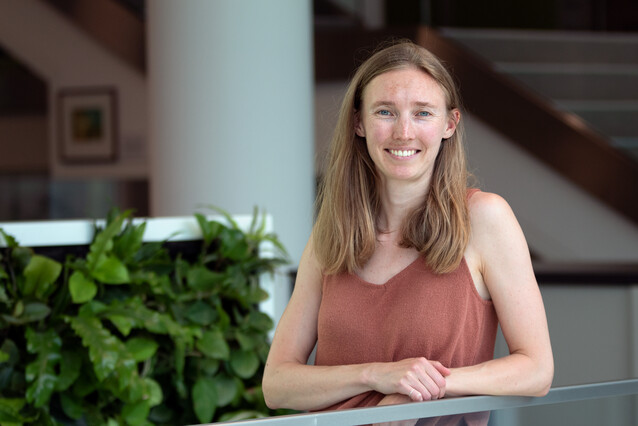Otto Hahn Medal and Award for Ida Jentoft
IMP postdoc Ida Jentoft was awarded the Otto Hahn Medal of the Max Planck Society for her PhD research in the lab of Melina Schuh at the Max Planck Institute for Multidisciplinary Sciences in Göttingen. Moreover, Jentoft was selected among the medallists for the Otto Hahn Award, which offers the opportunity to start a research lab as principal investigator with the Max Planck Society after her postdoc.
The Max Planck Society presented its Otto Hahn Medal to IMP postdoc Ida Jentoft for her PhD research with Melina Schuh at the Max Planck Institute for Multidisciplinary Sciences in Göttingen. The medal, given annually since 1978, is the Max Planck Society’s award for exceptional PhD research done in one of its institutes. Among the medallists, some “particularly worthy recipients” are selected for an Otto Hahn Award – this year including Ida Jentoft. The Otto Hahn Award provides for a long-term research residency abroad, followed by leadership of a research group on the scientist's own research topic at one of the Max Planck Institutes. The award is intended to pave the way for a long-term scientific career in Germany.
“I am very honoured to receive the Otto Hahn Medal and Award and grateful to my supervisor Melina Schuh for her guidance and support,” says Ida Jentoft. “The prospect of leading a lab within the Max Planck Society already at this stage of my career is extremely exciting – and I am very curious to find out where this will lead us.”
Ida Jentoft’s doctoral research has previously won an International Birnstiel Award for Doctoral Research in the Molecular Life Sciences – a first link to the IMP that intensified considerably after she joined the lab of Andrea Pauli as a postdoctoral researcher.
For her PhD, Jentoft studied the very first stages of embryonic development, which depend on maternally inherited factors such as messenger RNA (mRNA) and proteins. Jentoft investigated whether cytoplasmic lattices, long-lived filamentous structures specific to mammalian egg cells that are essential for early embryogenesis, are important for storing maternal proteins to ensure their faithful inheritance to the embryo. To do this, she compared the proteome of mouse eggs with and without cytoplasmic lattices. She found that several proteins needed in the early embryo are depleted when cytoplasmic lattices are missing. In normal eggs, these proteins are enriched on the cytoplasmic lattice filaments. The finding suggested that the cytoplasmic lattices serve as a mammalian maternal protein storage compartment.
More about Ida Jentoft's PhD research
We use a YouTube plugin to display social media content on this page, which places requests to YouTube servers. These requests make your IP address visible to YouTube, who may use it in accordance with their data privacy policy. Please agree to make the YouTube video visible. You can find more information in our privacy settings.
AcceptFurther Reading
On the Otto Hahn Award: https://www.mpg.de/prizes/otto-hahn-award
On the Otto Hahn Medal: https://www.mpg.de/prizes/otto-hahn-medal
Melina Schuh's Lab: https://www.mpinat.mpg.de/mschuh
